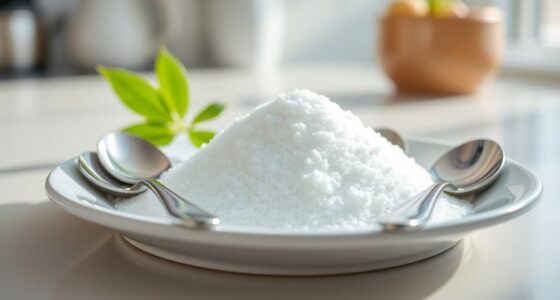Many believe decaf coffee is unsafe or heavily chemicalized, but that’s a myth. Most decaf is processed using water or carbon dioxide methods, which are safe and don’t leave harmful residues. Residual solvents are strictly regulated and tested, ensuring safety standards are met. Trustworthy brands fully disclose their decaffeination methods, so you can make informed choices. To learn more about these myths and the real standards behind decaf coffee, keep exploring the facts.
Key Takeaways
- Decaf coffee contains only 1-2 mg of caffeine per cup, not completely caffeine-free but significantly reduced.
- Chemical solvents like methylene chloride are regulated to ensure residual levels are safe for consumers.
- Water and CO₂ decaffeination methods are natural, chemical-free options that better preserve original flavor and reduce chemical concerns.
- All commercially available decaf undergoes safety testing, adhering to strict standards and regulations to ensure consumer safety.
- Choosing reputable brands and understanding decaffeination processes help address myths about safety and chemical residues in decaf coffee.

Have you ever wondered if decaf coffee really lacks the caffeine punch or if it’s just a marketing myth? The truth is, decaf isn’t completely caffeine-free—it usually contains about 1 to 2 milligrams per cup, compared to 70 to 140 milligrams in regular coffee. But your curiosity might also lead you to question the safety of decaf, especially with concerns about health and how it’s processed. Many people worry about whether decaffeination methods introduce chemicals or solvents into their beverage, or if those methods might pose health risks.
When it comes to processing methods, there are a few main techniques used to decaffeinate coffee. Some use chemical solvents like methylene chloride or ethyl acetate, which are effective but have raised health concerns for some consumers. The industry has strict regulations to guarantee that any residual solvents are within safe limits, but if you’re cautious, you might prefer coffees that use alternative methods. Other decaffeination techniques involve water-based processes, such as the Swiss Water Process, which relies solely on water and activated charcoal to remove caffeine. These methods tend to be viewed as more natural and free from chemical residues, addressing many health concerns.
It’s important to understand that regardless of the method, the goal is to strip caffeine while preserving the flavor and aromatic qualities of the beans. However, some processing methods can slightly alter the taste profile, making decaf different from its caffeinated counterpart. If you’re sensitive to chemicals or simply prefer a more natural approach, choosing decafs processed with water or carbon dioxide might ease your mind. Additionally, selecting decaf coffee from reputable brands that disclose their decaffeination process can help ensure safety and transparency.
From a health perspective, most reputable decaf coffees undergo rigorous testing to guarantee safety, and the residual levels of any solvents are well within acceptable limits set by food safety authorities. That said, if you have specific health concerns or allergies, it’s smart to look into how your coffee is processed. Some brands openly disclose their decaffeination process, allowing you to make informed choices based on your comfort level.
In essence, the debate about decaf’s safety largely hinges on the processing methods used. While chemical solvents are effective and widely approved, more natural methods like water processing appeal to those with health concerns about chemical residues. Knowing how decaffeination works—and that regulations keep these processes safe—can help you enjoy your decaf coffee with confidence, free from myths and misconceptions. Understanding the decaffeination process and its safety standards can further reassure consumers about their choices.
Frequently Asked Questions
How Does Decaffeination Affect Coffee’s Antioxidant Content?
Decaffeination slightly reduces the antioxidant retention in coffee, but it still provides health benefits. You’ll find that decaf retains most antioxidants, though in a somewhat lower concentration than regular coffee. This means you can still enjoy the health implications like reduced inflammation and improved heart health. If you’re mindful of antioxidant intake, decaf remains a good choice, offering many of the same benefits without the caffeine jitters.
Are Organic Decaffeination Processes Safer Than Conventional Methods?
Think of organic decaffeination as a refreshing change—safer than conventional methods because it avoids chemical residues, thanks to strict organic certification standards. You’re less likely to encounter synthetic solvents, making it a healthier choice. While no method is perfect, organic processes prioritize natural methods, reducing potential risks. So, if safety is your priority, organic decaffeination offers a cleaner, more transparent option for your coffee ritual.
Is There a Difference in Taste Between Decaf and Regular Coffee?
You’ll notice a difference in taste between decaf and regular coffee, mainly in flavor profile and brewing differences. Decaf often has a milder, sometimes slightly altered flavor due to the decaffeination process. Brewing decaf may require adjustments to your usual method to bring out its best flavor. While some find the taste comparable, others notice subtle nuances that set decaf apart from regular coffee, making it a unique experience.
Can Decaf Coffee Cause Caffeine Withdrawal Symptoms?
Yes, decaf coffee can cause caffeine withdrawal symptoms if you’re dependent on caffeine. You might notice headaches, fatigue, or irritability as your body adjusts. Even though it contains less caffeine, your dependence still exists, so cutting back suddenly can trigger withdrawal symptoms. To avoid this, gradually reduce your intake instead of stopping abruptly. Staying aware helps you manage withdrawal symptoms and maintain your coffee routine comfortably.
How Do International Standards Regulate Decaffeination Safety?
International standards regulate decaffeination safety through strict regulatory compliance and safety standards established by organizations like the FDA and EFSA. These agencies set permissible solvent levels, require thorough testing, and enforce labeling regulations. You can trust that decaf coffee meeting these standards is safe, as manufacturers must adhere to rigorous protocols to guarantee contaminants are kept within acceptable limits, ensuring consumer safety and product transparency.
Conclusion
Don’t let myths fool you—decaf isn’t just for the sensitive or the cautious. It’s a choice backed by safety standards and modern decaffeination methods, not harmful solvents or questionable practices. While regular coffee packs a caffeine punch, decaf offers a gentler alternative. So, next time you sip on decaf, remember: it’s not about avoiding coffee, but choosing a safer, cleaner way to enjoy your favorite brew—without sacrificing flavor or peace of mind.









